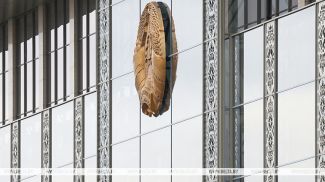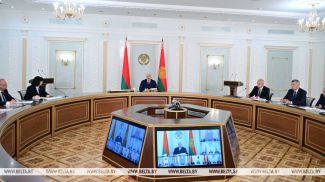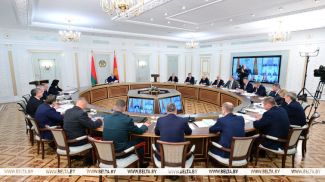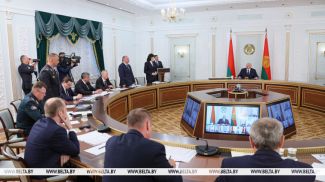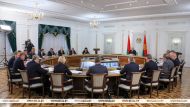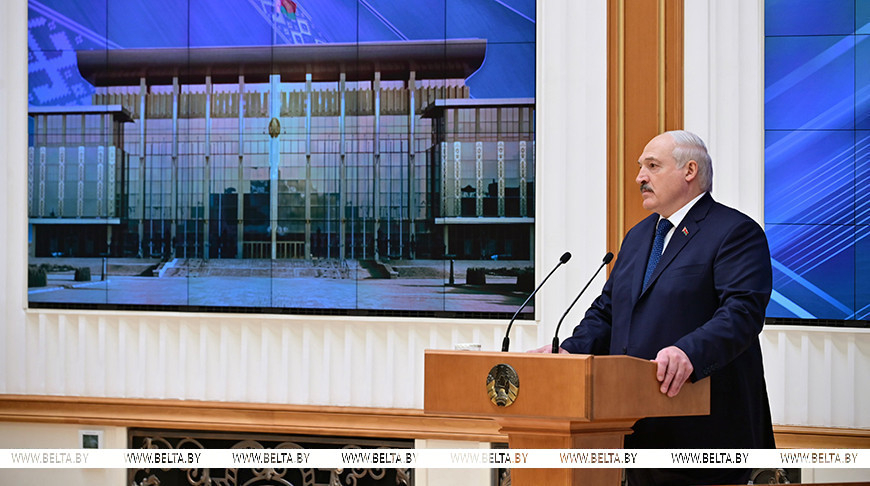
News of the story
"President's Week"
The work schedule of the Belarus president is always full of events. Aleksandr Lukashenko holds conferences and working meetings on the most topical matters concerning the country’s development, regularly visits the regions, goes on foreign trips and welcomes foreign guests, talks to reporters, signs decrees and laws. And even if there are no public events, it does not mean that the head of state does not work. It must be said that even when he relaxes, for instance, by playing ice hockey or chopping firewood, Aleksandr Lukashenko happens to find the time to give yet another instruction. All the decisions must be prompted by life, he likes to say.
The President’s Week project is intended for those, who want to keep up with the head of state, be up-to-date on the latest statements and decisions of the Belarusian leader.
This week the head of state has held another massive government conference. This one focused on the development of the countryside and ways to improve the effectiveness of agribusiness. The matter is particularly topical due to the ongoing active spring field work. Belarus’ agribusiness works well but the current results are insufficient. Particularly the observance of labor discipline and production discipline at all stages. This is why Aleksandr Lukashenko encourages agrarians and all the officials responsible for this economy branch to work hard, forget about Western sanctions, and produce results.
Another government conference focused on preparations for the forthcoming session of the Belarusian People’s Congress, which will convene for the first time in its new constitutional capacity.
A number of important decrees have also been signed this week to appoint personnel in the Central Election Commission, the Investigative Committee, and the Supreme Court.
In continuation of Belarus-Russia cooperation in space industry Aleksandr Lukashenko signed a decree on the Belarusian space system for the remote sensing of Earth.
The head of state ended the work week by participating in a nationwide subbotnik (voluntary labor day). The apple orchard planted by the president will be another embellishment of Aleksandr Lukashenko’s hometown area, which he recalls with fondness and often visits the places he has known since he was a kid. And local school students will have to take care of the trees as part of their labor education classes. They will literally enjoy fruits of their labor every autumn.
FIGHT IN THE FIELD. What goal does Aleksandr Lukashenko want agribusiness to achieve?
The practice of holding massive government conference to analyze the state of affairs in specific branches of the economy continued with a discussion about prospects of development of the countryside and ways to improve the effectiveness of agribusiness on Tuesday, 16 April. Before this conference Aleksandr Lukashenko had held a major conference to discuss national security with representatives of defense, security, and law enforcement agencies this year. A government conference took place a week before to discuss the state of affairs in the manufacturing sector.
“The living standards of our people, foreign exchange earnings, food security and, ultimately, social and political stability in the country largely depend on the state of affairs in the countryside,” Aleksandr Lukashenko emphasized. In general, agricultural workers have something to be proud of. Belarus fully provides itself with staple foods and is head and shoulders above other CIS countries in per capita production and consumption of such products. Belarus looks very solid across a number of indicators in global rankings. Belarus-made foodstuffs are supplied to more than 100 countries around the world. Foreign exchange earnings from their sales amounted to almost $7.5 billion in 2023. And this was amidst a sharp drop in world prices.
“This year we should aim to increase the output by 6-7% and to export $9 billion worth of agricultural products. A difficult task? Yes, it is. But we must meet these challenges. I call on managers of all levels. You should always strive for more than you have already achieved,” the head of state said.

At the same time 2023 saw modest agricultural output figures. Agricultural production inched up by slightly more than 1% (crop production fell by over 1%, livestock production expanded by 4.5%). “Taking into account how much has been invested in the agricultural sector, this is more than a humble result,” the president emphasized.
During his introductory speech and as the conference progressed the head of state primarily drew attention to shortcomings and deliberately highlighted problems in Belarusian agriculture. “If the problems remain unresolved, then all our successes will very quickly come to naught,” the head of state explained. “Our strategic goal is to set up a high-tech, profitable agricultural sector. It is vital we maximize the potential of our agricultural industry, to tackle the current problems, to think about tomorrow and even the day after tomorrow.”
The country’s food security has been ensured but more needs to be done, Aleksandr Lukashenko stressed. Food is also an important export. Demand for food all over the world continues rising. It is necessary to move on, make the operation of the agribusiness more sustainable and ensure its progressive development.
All the opportunities for achieving these goals are available but financial and economic results, the observance of process specifications and discipline are not where they should be yet. The president has no intention of putting up with it. The head of state warned that the governors of Vitebsk Oblast, Mogilev Oblast, and Gomel Oblast where problems in agriculture are most pronounced will face toughest repressions if these regions fail to produce the expected results this year. But everyone has to mobilize. Because even in western parts of the country where agriculture does better the head of state sometimes has to point out obvious shortcomings such as the need to pick up stones from farmlands.
“As I approve the appointment of heads of district administrations, I always say: ‘Guys, I need results! If you don’t want to fight a war, you need to produce results on the ground!’ Put your back into it and work. If you want, roll up sleeves and work.”
The president gave a useful piece of advice to agrarians and other people: forget about sanctions and other Western horror stories: “Certainly, they exist. But we should forget about them. We need to focus on expanding production and exporting high value-added goods, developing the national brands ahead of competitors, carving our new product and geographical niches. There is no other way.”
The head of state suggested taking a look at the situation in agriculture across the board taking into account the problems and possible options for resolving them.
Crop farming
Aleksandr Lukashenko stated that last year’s performance was almost a failure: the results were worse than in 2022. Agricultural workers missed the output targets by over 1 million tonnes of cereals, 63,000 tonnes of vegetables, and 10,000 tonnes of flax fiber. Almost every third agricultural enterprise had the grain yield below 20 centners per hectare. “The government traditionally blames unfavorable weather conditions. Oblast governors repeat the same mantra. However, we must admit that the weather was not the only problem,” the president pointed out.
The structure of the area under crops, the application of compound fertilizers, and land amelioration demonstrated shortcomings.
For instance, the area under wheat is expanded in individual districts but on lands that are not fit for this crop. The practice results in lower harvests and losses. “I have repeatedly given instructions to expand the land under protein crops to fully meet the needs of livestock farming and substitute imports. By the way, the enterprises that did this had no problems with feed,” the head of state cited another practical example.
Meanwhile, the amount of mineral fertilizers used on the fields has been reduced. Not all measures are applied to protect agricultural crops. There are also problems with the amount of fertilizers stockpiled ahead of the spring sowing campaign. By the way, the application of compound fertilizers of the NPK variety is a cutting-edge global trend. And Belarus has all the resources for it.

As for land amelioration, Aleksandr Lukashenko has repeatedly revisited the matter during government conferences and working trips. All the necessary instructions have been given and decisions have been made. It is necessary to only precisely fulfill them instead of complaining later about all kinds of unfavorable weather phenomena such as excessive moisture, freezing air temperatures, and droughts.
“You need to be able to work in any weather to avoid blaming the weather for your shortcomings. After all, we all know what the weather can be in Belarus. And you had to adapt to that. Those who want to work have adapted to it,” the head of state said.
The quality of Belarusian seeds was also mentioned. From personal example Aleksandr Lukashenko noted that if the process specifications are observed, then there will be no complaints about the harvest. Although crop breeders definitely need to improve things in individual areas.
The government conference also touched upon the current sowing campaign. According to the reports submitted to the president, there are problems in individual regions. In particular, problems with the readiness of machines and vehicles. “Your task, the task of the central government, the oblast administrations and the district administrations is to guarantee equipment readiness throughout the entire agricultural year. It is your personal responsibility,” Aleksandr Lukashenko said.

Attention should also be paid to matters concerning the preservation of machines and vehicles. For instance, powerful tractors are literally worth their weight in gold, this is why the head of state wants them maintained practically the way aircraft are maintained.
“If some oblast governors intend to satisfy their needs with imported machines and vehicles, I recommend they should abandon these phantasies. Totally. We discussed it during a conference on the manufacturing sector not so long ago. Don’t tell me that imports are better than our products. Particularly today,” the head of state warned.
He also mentioned the need to update the country’s fleet of tractors, vehicles, and machines. Agrarians need machines and vehicles with a high throughput capacity, more powerful tractors, harvesters, feed dispensers, and so on. This is why instructions were given to update program tasks and ensure the production of the entire lineup of highly efficient machines. At the same time, it is necessary to train farm machine operators to handle these complicated machines and vehicles.

The president stressed that it is high time the agribusiness had switched to new technological standards across the board and embraced precision farming. “Smart agriculture today and in the future is an important priority in the fight against competitors. We need a program, including for personnel training,” Aleksandr Lukashenko said. “It is necessary to start today. We need to accomplish a revolution in building machines and vehicles for agriculture and in running the agriculture.”
At the same time, it is possible to improve performance by 1.5-2 times today if proper discipline is observed, if highly productive crop varieties and animal varieties are used, the president is convinced. “This is why tasks for 2024 are much more ambitious than yesterday’s results. It is necessary to harvest about 10 million tonnes of grain, 5 million tonnes of sugar beets and more than 1 million tonnes of rapeseed this year,” he added.
Animal husbandry
The manufacturing of animal products was one of the topics covered by the government conference. In 2023 the output of animal products grew higher in all parts of the country, with the output growth rate at 104.5%. But dairy animal husbandry is practically the only stable source of monetary earnings on a daily basis.
Belarusian farmers milked over 8 million tonnes of milk last year, 6% up from 2022. Areas with the highest milking herd productiveness figures were Grodno District, Berestovitsa District, and Nesvizh District, with the milk yields of over 9,000kg per cow. While leading performers can get even 12,000-13,000kg of milk per cow, the poor performers get less than 3,000kg per cow on the average. The latter can be found primarily in eastern parts of the country. “It is time to think about tying wages of heads of agricultural enterprises to the performance of the enterprises. If they don’t produce results, they will get minimal wages,” the president said.
He instructed the central government, the oblast administrations, and the district administrations to study the state of affairs in low-performance agricultural enterprises in detail and take the necessary measures. Enlarging agricultural enterprises is one of the ways to improve their efficiency. “It’s not right when processing enterprises take out loans and spend years paying them back. It turns out that this is not a business, but a social project,” the president said. “This means that we need to break the pattern. The lands and assets of loss-making farms should be transferred to well-performing companies as part of the enlargement scheme. Modern large-scale dairy and pig-breeding complexes should be built at aggrandized enterprises.”

“The decision to go for enlargement has proved to be right. And this work must be completed by 2030,” the head of state said.
The president instructed the central government and the oblast administrations to ensure the unconditional implementation of investment projects to build dairy complexes, increase the number of high productivity livestock (not less than 6,500kg per cow) and ramp up milk production to at least 9 million tonnes.
The need to preserve more cattle and poultry is a traditional problem in the Belarusian animal husbandry industry, however, the situation remains complicated. Aleksandr Lukashenko instructed the prime minister and the State Control Committee to get to the bottom of it and report. Especially since the head of state had previously given clear instructions to transfer young animals to better performing agricultural enterprises if the previous owners cannot raise them to maturity. However, this work is often formalistic.
The president demanded that the central government, the Agriculture and Food Ministry, the National Academy of Sciences of Belarus, the oblast administrations, and the district administrations should organize strict oversight over local efforts to observe process specifications and standards for feeding cattle and poultry. Close attention should be paid to taking care of newborn calves. Just like in many other matters it is necessary to observe labor discipline and process specifications at all levels.
Speaking about pig farming, the head of state encouraged participants of the conference to think about the future and work out a ten-year strategy of development of ultra-modern pig breeding in Belarus. The strategy should embrace all kinds of things: advanced genetics, feeds, environmental friendliness parameters. The goals are extra-ambitious: improving the depth of processing as much as possible and expanding export.
Approaches to building pig farming complexes using a unified design to accommodate 100,000 head of pigs per facility have already been worked out in Belarus. Larger projects are being implemented in a number of countries, including Russia. They build complexes able to house up to 500,000 head of pigs. For instance, China is building a multistory pig breeding complex.

A number of instructions concerning poultry farming were also given. The president mentioned a slight increase in poultry production and a decrease in egg production. There is also a problem with poultry mortality, which has increased by almost 12%. On top of that meat poultry farming still depends on importing the nucleus stock. “The key task is to reduce this dependence. In a revolutionary manner,” Aleksandr Lukashenko instructed. “We still have no alternative but to import chickens in order to make hatching eggs.”
The construction of a modern breeding and genetics facility that will focus on egg-laying poultry is supposed to mend the situation. Where and on what conditions it will be built is being decided now.
The overall strategic task is to ensure technological protection and biological protection of poultry farming, increase the output to 800,000 tonnes of poultry meat and 4 billion eggs.
Feed availability
Aleksandr Lukashenko instructed the government, the Academy of Sciences, and the oblast administrations to work out a strategy on supplying the Belarusian animal husbandry industry with concentrated feed. It is necessary to make sure that every agricultural enterprise has all kinds of feed and as much as it needs (at least 45-50 centners of feed units per livestock unit).
The president stressed that success of the animal husbandry industry is inseparable from feed production. However, 2023 saw only 91% of the targeted amount of grass forage harvested. The technologies for harvesting and storing grass forage get violated, thus reducing the already insufficient feed supply.
The head of state reminded that a cutting-edge complex for making amino acids and combined feed had been built in the country – the Belarusian National Biotechnology Corporation. He demanded that all capabilities of this enterprise be used to make balanced feed.

Aleksandr Lukashenko also pointed out that in order to resolve the problem of feed availability it is necessary to finally resolve the problem of silage trench. “You may die trying but make sure that all the feed is stored in good storage facilities throughout this year. It is necessary to finally get away from these mounds. We used to place forage in natural trenches, pits, and the rest. If we place forage in such pits, we routinely lose at least 30% of the forage,” the president remarked.
Processing
The head of state stressed that reserves of Belarusian agriculture are concentrated in the processing branch. “It is necessary to set the course for in-depth processing of raw materials, which creates a high added value. Everything should be processed without exception. Even pig’s squeal,” the Belarusian leader stressed. “The market gives our processing enterprises a chance to expand the product range and the geography of deliveries, and gain a foothold in high-margin segments.”
At the same time Aleksandr Lukashenko criticized the insufficient utilization of production capacities and low utilization in some places, although the demand is high in foreign markets, especially for certain types of products. Some enterprises have been known to sell products as carcasses and half-carcasses through intermediaries.
“They lack business acumen. Especially the oblast governors who are responsible for this sector of the economy,” he said. “This mess must not exist! The ultimate goal is to ensure 100% processing of domestic raw materials with a high added value. To this end, I instruct the government to digitize the tasks of every oblast down to individual enterprises in order solve this problem.”
Financing
It is necessary to examine the efficiency of state support granted to Belarusian agriculture, the president demanded. “We need to look into this matter once again. I feel that the worse an enterprise performs, the more support it gets. Then why would they want to work better? It’s just a waste of money,” the head of state said.
Aleksandr Lukashenko instructed to analyze the situation and submit a report. He emphasized that the measures being taken to financially rehabilitate agricultural organizations are extremely inadequate.
The head of state drew attention to the insufficient work to integrate loss-making agricultural enterprises into well-performing companies. At the same time, Aleksandr Lukashenko emphasized that such decisions must be made after thorough consideration. Struggling enterprises should not become a burden around the neck of successful enterprises on a whim. Yet it is necessary to act more decisively in this area. “This problem must be solved this year,” the president instructed.
Apart from that, for instance, no return has been secured from the establishment of agribusiness groups in Vitebsk Oblast. “Who will tolerate this? [Vitebsk Oblast Governor] Aleksandr Mikhailovich Subbotin swore to rectify the situation. I’m waiting,” the head of state raised the problem.
Human resources
The president described workforce shortage as a systemic problem of Belarusian agriculture. Both executives and blue-collar specialists are in short supply. Higher education institutions and vocational schools introduce quotas for training specialists of all kinds via employer-sponsored education schemes. The graduates are granted preferential loans and monetary bonuses, affordable housing but in the end not all of them stay on the job even despite the tough penalties associated with failing to complete the mandatory post-graduation term of service.
Aleksandr Lukashenko stressed that those, who sign up for employer-sponsored education schemes, must honor their contracts. At the same time it is necessary to continue working to enable attractive conditions for work and life in the countryside: “It is impossible to solve the problem of personnel shortage without creating proper conditions in rural communities. Medical care, transport, retail, consumer services. Stable access to the Internet and some other things for young people.”

He noted that there are well-performing agricultural enterprises in the country that are an example to follow. They grow on their own and small rural communities aka villages of the future prosper thanks to them as well. “Replicate their practices. Don’t wait for new five-year terms. People have to want to work there!” the president instructed.
in addition to administrative measures every agricultural enterprise needs its own system for retaining personnel. “Think about ways of attracting and retaining young people. From housing to exemplary working conditions, cultural opportunities, healthcare in the countryside. If we do not solve the problem of personnel shortage in agriculture, there will be no economy,” the Belarusian leader stressed.
Labor discipline
Law enforcement agencies report that the agricultural sector has the biggest number of violations of labor discipline. Many people show up for work while drunk. The number of injured workers and the number of fires are on the rise.
Multiple facts of corruption, economic crimes, forgeries by officials, thefts have also been uncovered. Some simply try to embellish the state of affairs while others steal from the state.
Some cases are simply outrageous. Aleksandr Lukashenko cited an incident that occurred in the town of Lyuban, Minsk Oblast: “I don’t even know what to call these people. They went so far as to remove carcasses of dead cattle from burial grounds, butcher them and sell them as meat to the population. Moreover, veterinarians and other specialists of agricultural enterprises from three districts (Lyuban District, Osipovichi District and Staryye Dorogi District) were involved in this sacrilege.”
“Such blatant irresponsibility, negligence and carelessness in the performance of official duties require toughest action,” the Belarusian leader emphasized.
Call to put reports in order
The need to sort out reporting practices was also mentioned during the government conference. According to Aleksandr Lukashenko, red-tape and huge excessive paper flow can be called one of the factors that slow down agriculture as a whole. “Concerns want reports for their own needs. The Agriculture and Food Ministry wants reports. The oblast and district authorities in charge of agriculture want reports. Oversight and law enforcement agencies want reports as well. Everyone sends information queries,” the president criticized. “One organization may have to deal with up to 70 queries per month!”
The head of state stressed that the process can be and should have been automated in a centralized manner: “We talk about benefits and the success of digitization at every turn. Then use it.” The president demanded to sort out these procedures. The Agriculture and Food Ministry will have to work out a precise system of reports and information sharing.
PRELAUNCH CHECK. What was discussed in the president’s office one week before the Belarusian People’s Congress?
On 18 April the president convened a government conference to discuss preparations for the first session of the 7th Belarusian People’s Congress. Preparations for this event, which is scheduled to take place on 24-25 April, are in the final stage now.
Organizational matters, which had to be discussed in order to ensure efficient operation of the Belarusian People’s Congress, were in the center of attention. “The organizing committee has been set up. According to the reports I constantly get, it has already held meetings and compiled the main documents. But there are a number of issues related to the permanent presidium, deputy chairpersons. We should consult on how we will suggest that the Belarusian People's Congress select them. In short, it is necessary to ensure a normal, manageable working process of the Belarusian People’s Congress starting with decorating the city (without going overboard and wasting money) to the meeting chamber,” the president emphasized.

The head of state spoke at length about the organizational aspects related to the provision of the delegates with everything they might need. “I would like to ask you once again to make sure the delegates of the Belarusian People’s Congress have everything they need, including catering, accommodation and all necessary materials for work.”
By the way, this week Aleksandr Lukashenko has signed a decree to institute lapel badges for delegates of the Belarusian People’s Congress.
According to Prime Minister Roman Golovchenko, the organizing committee for preparing the Belarusian People’s Congress has been working hard. All the instructions given by the head of state in connection with this large-scale event are being fulfilled in a timely manner.
“The list of participants of the Belarusian People’s Congress is complete. Matters of their transportation, accommodation, catering, and security have been worked out in detail,” Roman Golovchenko said. “The list includes 1,162 delegates, including 412 delegates ex officio and 750 by election, including 402 men and 348 women.”
As many as 350 people have been delegated by municipal councils of deputies and 400 by the civil society. “All procedures for electing the delegates have been carried out in full compliance with the law,” the prime minister stressed.
As for the invited participants of the Belarusian People’s Congress, who are not delegates, there are 715 of them, including 68 honorary representatives of the general public and seven regional delegations, each of which includes 68 people, including representatives of regional mass media, healthcare system, education, law enforcement and security, enterprises in addition to former heads of regions and honorary citizens of administrative territories. As many as 31 foreign citizens (representatives of interstate integration associations and foreign diplomats) are expected to attend the Belarusian People’s Congress.
PLANT AND CHOP! What did Aleksandr Lukashenko do during the national cleanup day?
The Belarus president planted an apple orchard in his hometown area on 20 April, on a national cleanup day (aka subbotnik). The head of state helped plant over 200 trees of five varieties. Four of them have been bred locally while the fifth one is a summer apple variety from the USA.
Local school students will take care of the planted apple orchard. “We are doing it in order to hand it over to school students later on. So that they could take care of the trees and take results of their labor for themselves. As I said, every school should have its own garden where kids can work with their hands. To reduce the silliness in their heads. These school students will work this land plot like a household plot of their own,” the head of state said.
Aleksandr Lukashenko explained that the land plot where the orchard was planted had belonged to local countryside residents earlier. But these days village houses are mainly used as summer cottages while the current owners and their successors use only a small part of the allotted lands for their own vegetable gardens.

“It was a wasteland. We planted apple trees to keep the land in use,” the president said.
As part of the national cleanup day Aleksandr Lukashenko invited all participants of the event, including reporters, to get their hands dirty. It is the president’s principle: those, who works alongside him every day, have to switch microphones and cameras for rakes and spades during a subbotnik. After that the head of state believed that the reporters had been slacking and invited everyone to chop some firewood. They had to take up the extra assignment.

One of the participants of the president’s subbotnik was Igor Abramchik, head of the private farming enterprise Spartan-Agro located in Molodechno District, Minsk Oblast. He can be described as a hereditary farmer: the business was started by his father. He makes money by gardening although he is an IT specialist by education and has graduated from Belarusian State University of Informatics and Radioelectronics (BSUIR). He grew up in the countryside. This is why the young man was still inclined to go back to work the land. He could use the knowledge he acquired while in the university then.
“A farmer. A hard worker. By the way, he is not an agrarian by education,” the head of state said as he introduced Igor Abramchik to reporters. Aleksandr Lukashenko suggested the farmer should step up his operation right away: “We can give you a kolkhoz. I advise you to select a good farm while the supply lasts. The local lands are quite good.”
Aleksandr Lukashenko remarked he had never been engaged in gardening when he had worked in agriculture. He had to get to know these things when he became the president. “Because we import apples. Particularly Polish ones. But his apples are better than any Polish ones. Most importantly, they are more organic. Because he knows that if he tries to sell a poor-quality product on the market, we will hold him responsible. We cannot hold Poles responsible… The same is true about healthcare and education. If a doctor takes a scalpel in their hands, they know that they have to do their best. Because they will be held accountable,” the head of state said.






